Glass Man speaks to British-French actor Oliver Jackson-Cohen on why he changed his own narrative to play the bad guy
From Winter Issue 56
Oliver Jackson-Cohen has always had blind faith. The bolstering type that bounces rejections off you without a flinch. But he’s far from arrogant. Rather he’s unfailingly modest, charming and even a little self-deprecating, finding a silver lining in the most dispiriting – and wet – circumstances. “It feels like the end of the world,” laughs the British actor as he looks out of the window in the midst of Storm Ciaran. “Let’s enjoy it.”
While a lot of his career has been marked by storylines that fit the dark and gloomy atmosphere that we spend our morning in, Jackson-Cohen reassures me that he is nothing like his characters. “I’ve played a lot of toxic men. Can you imagine if I was like that?” It’s true, he has rarely played the good guy.
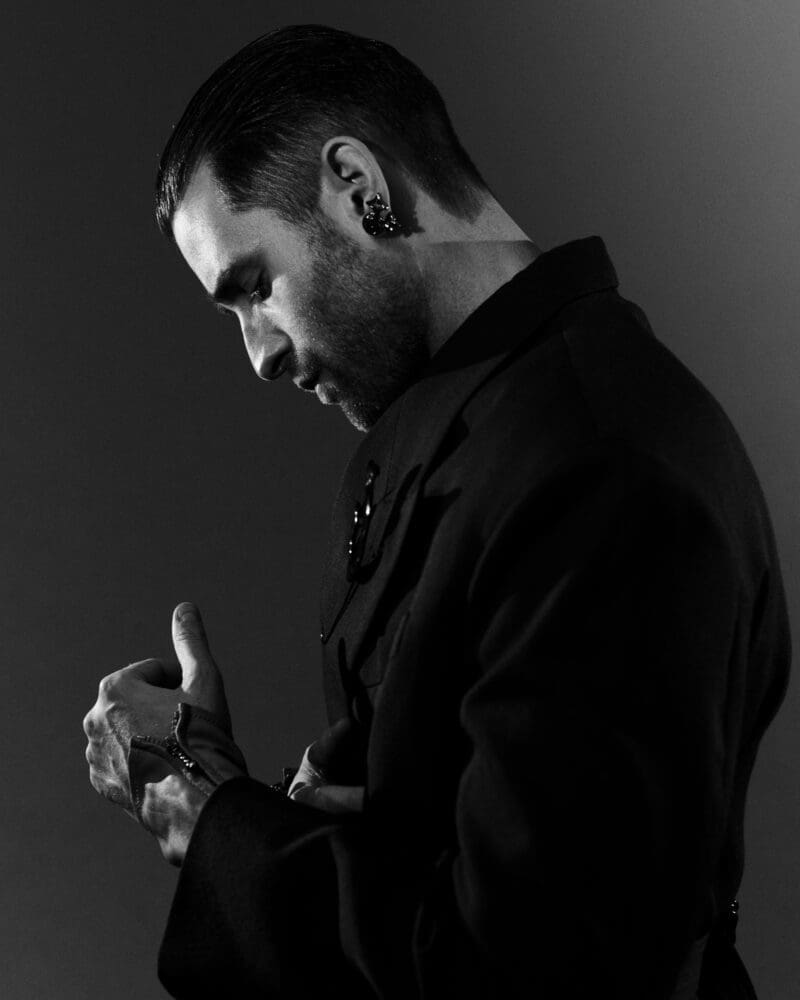
Photographer: Jason Hetherington
“I think as audiences we’re all quite voyeuristic,” he begins to explain. “We all want to see something real happen on screen so I feel like it has to come from you in order for it to be real. It’s been hard at times having to tap into certain parts or behaviours that I try to avoid in myself. The trick is trying to rationalise it within yourself to get to that point that they have.”
Comparing it to a music studio, where you can turn the dials up and down, he admits it took him a long time to realise performance is about adjusting rather than transforming yourself. “I feel like this idea of stepping into someone’s shoes has always messed me up. When I was younger, I thought I had to be someone else, someone completely different.”
Describing himself as the “weird”, “insular” and “quiet” child, Jackson-Cohen spent his childhood in London battling with wanting to be self-expressive but also enjoying the comfort of being in the shadows. “I was shy but secretly really wanted attention,” he admits. “But then I would feel deeply embarrassed if I got it.”
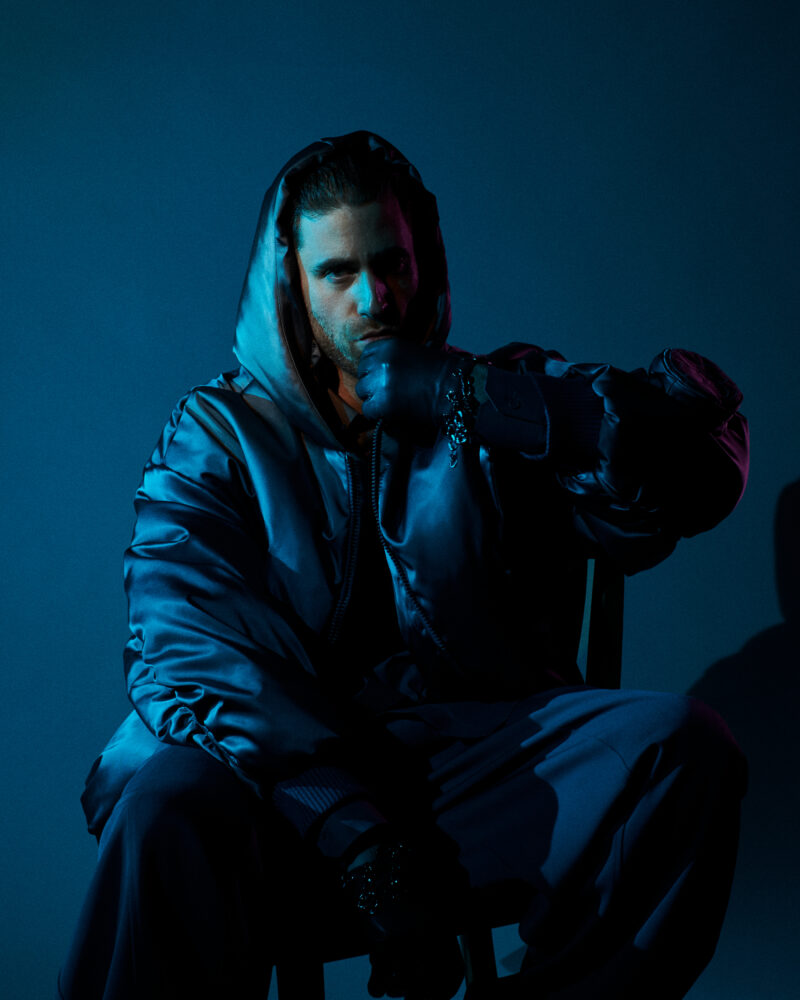
Photographer: Jason Hetherington
When he was eight, he was nudged into drama classes every Tuesday after school. “I fucking loved it,” he explains. “I think that as a kid I found this abundant space in acting where you could go and hide in a way and be something different – like a weird playground where you could experience everything at no risk because ultimately none of it was real.”
A few years went by and he slowly began to feel more comfortable. “I grew up a bit,” he notes. “I found this drama group at Riverside Studios called Youngblood when I was 11.” It was here, alongside Carey Mulligan and Imogen Poots, among others, that passion became craft. But despite this ascent to a higher level of drama education, Jackson-Cohen still battled with being an introvert – and still does.
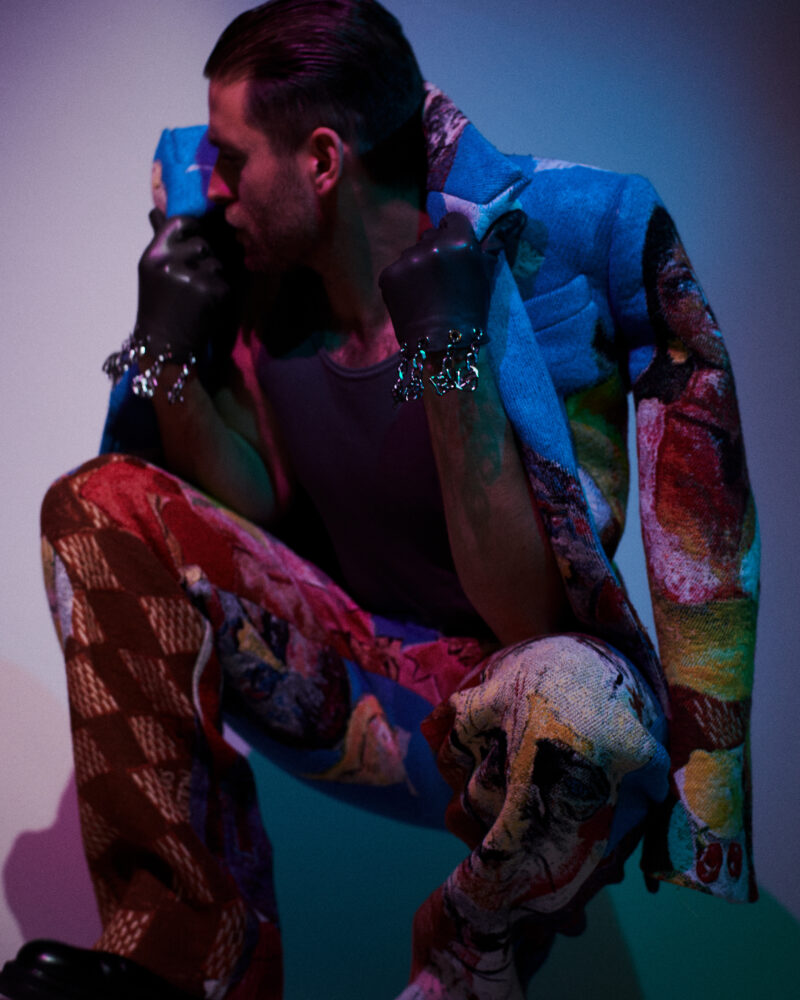
Photographer: Jason Hetherington
“I remember a family member coming along to one of our plays that we would put on and after the show telling me I needed to come out of my shell,” he recalls. “I feel like a lot of people think because you do this, you love to be the centre of attention, in the spotlight. You do under certain circumstances, but then a lot of the time, maybe it’s just me, I’d rather no one look, and I hide away in my house. It’s a constant fight that you’re up against.”
Despite this contradiction, after “millions” of auditions, the 15-year-old got his first television role. “It was an episode of late-night Hollyoaks,” he recalls amusingly. “At the time I was beside myself, like I couldn’t quite believe it. I was, like, ‘this is it’. I walked into school the next day – I was a monster with it. Then I watched it back, and I realised I was crap in it, so I needed to pipe down a bit on the confidence.”
Suffice to say, his career didn’t quite take off after that. Instead, Jackson-Cohen added to his list of skills by interning in production, working as a runner for the BBC and MTV in between finishing school. “There was nothing really telling me that I was great at acting. Like there was none of that – it was a stab in the dark. I always sort of thought if it doesn’t work out, I want to do something in production.”
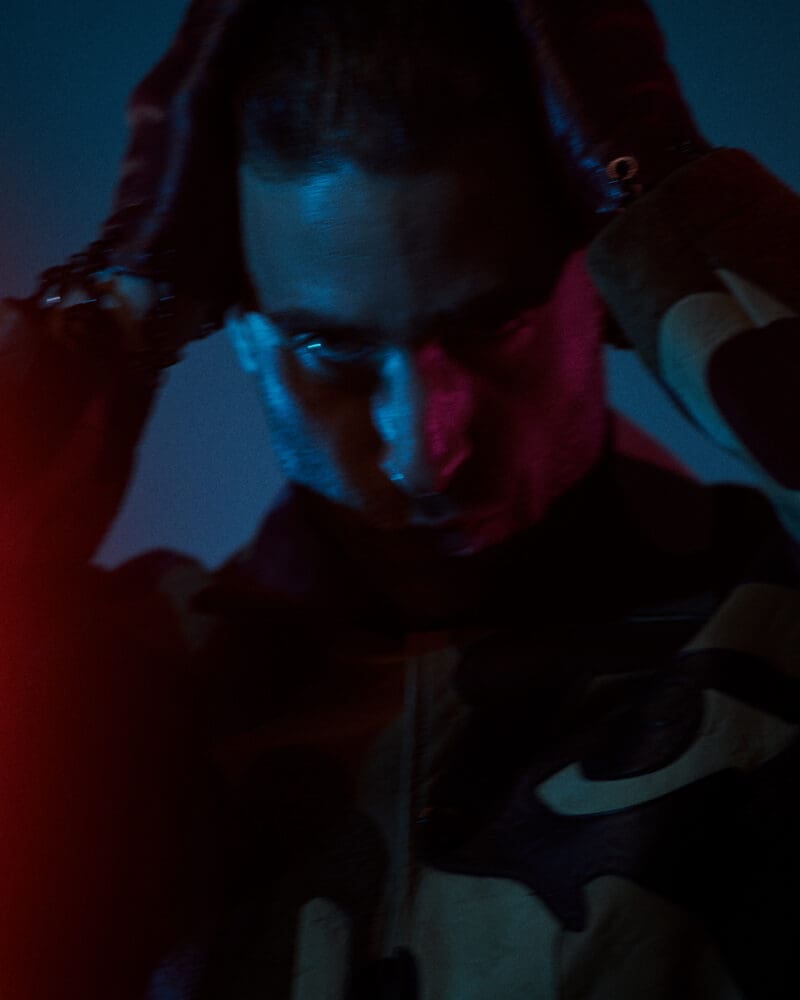
Photographer: Jason Hetherington
There was a conventional mould that Jackson-Cohen was desperate to break. But there was a lot of hesitation, warnings and odds stacked up against him. “I remember it so clearly, it was careers day and every single person told me ‘you’re stupid’, ‘don’t do that’, ‘go to university and get a degree’.” So, he did.
But his degree in French literature lasted a matter of weeks before a “dangerous mix of ambition and delusion” took control and led him to New York’s Lee Strasberg Theatre and Film Institute to do a foundation degree.
This move across the pond was again a moment of the aforementioned blind faith that is part of his character. But, this time, it was slightly different. It was in between sleeping on his sister’s sofa and attending drama classes when Jackson-Cohen’s phone started ringing.
“I did this period drama job straight out of school. It was great and I got paid.” The show in question was a small BBC adaptation titled Lark Rise to Candleford – niche, historic and typically British. However, unbeknownst to him, as he arrived in America the series had been sold to PBS, a nationwide US channel.
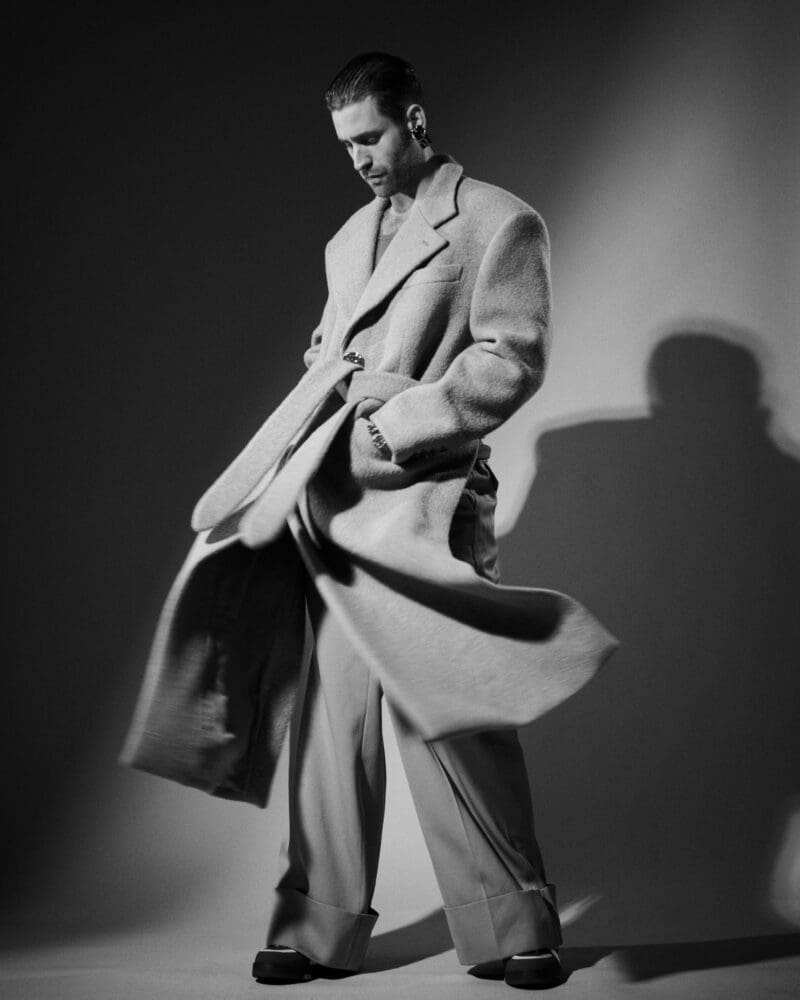
Photographer: Jason Hetherington
“I got phone calls from managers and agents asking for me and sending me out for auditions while I was studying,” he says. “I had been there for six or seven weeks, something like that. I got this audition and they flew me to test in LA. I got the job and then everything snowballed so I ended up dropping out of drama school.”
What happened next was a snowball effect of jobs in both television and film. But he slowly began to express scepticism, the sort that demonstrates unfulfillment. The very idea of becoming an actor is met with doubt – no one knows that better than Jackson-Cohen. But, when a continuous stream of work arrives, you’re obviously not going to turn it down. That would be stupid. However, after a run of scripts and characters that didn’t necessarily align with him, he took a step back in 2017.
“I felt like I was drowning a lot of the time,” explains the 37-year-old. “I felt quite lost in the beginning because I was listening to all of these people around me telling me what to do. I didn’t really know what I wanted to do, I just knew I wanted to act. I think through the process of doing all of these jobs I hadn’t really ever stopped. I never felt like I was entitled to have an opinion over what kind of work I felt comfortable with.”
It was in this pause that he says he just started saying “no”. Looking beyond the option of just working and into what resonated with him creatively, he returned after a year with Netflix’s behemoth horror series, The Haunting of Hill House.
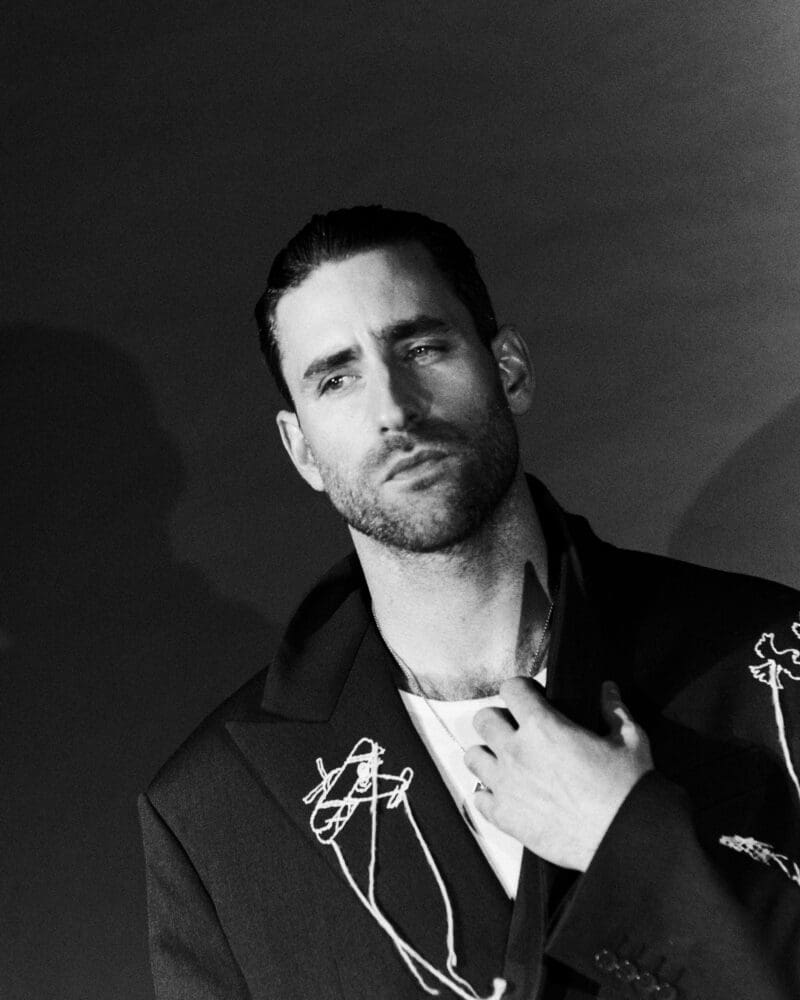
Photographer: Jason Hetherington
Meeting again in less soggy circumstances and with the SAG-AFTRA strike lifted, I could finally ask him why this particular project. “At that particular time in my life, that character felt like I didn’t have to hide any part of myself. I could just be vulnerable,” he explains, touching on his role as Luke Crain. “I wouldn’t have to pretend to be a confident six-foot three male. I could put all of myself into something, and I got to say something with that character that I really meant.”
Despite the intended shift, the actor couldn’t escape the typecasting. “People are desperate to put you in a box. Post Hill House, the amount of horror scripts that came my way was insane. It’s like you’re sort of missing the point, this was about childhood trauma.”
Shortly after, he starred in its sequel, The Haunting of Bly Manor, and then in the commercially successful The Invisible Man and critically acclaimed Emily. But it’s in his two latest projects that depict the many textures of Jackson-Cohen’s range.
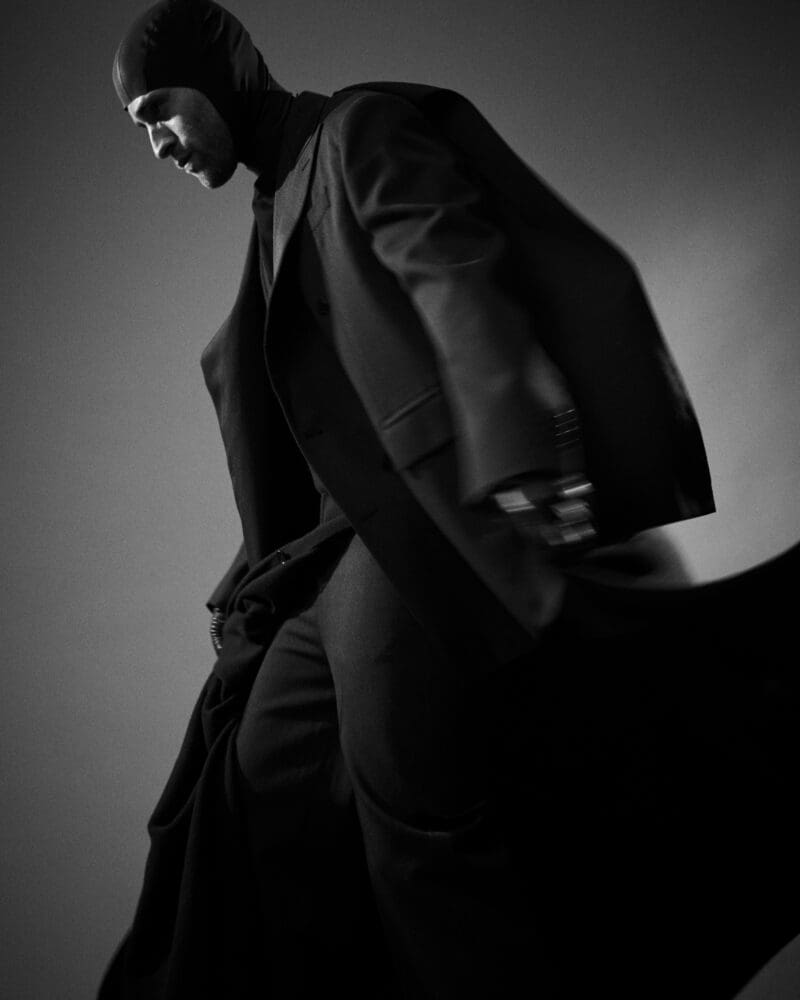
Photographer: Jason Hetherington
Currently streaming on Amazon Prime, the actor stars as Will Taylor, the unfaithful husband in the psychological thriller, Wilderness. “It was one of those scripts that I remember exactly where I was when I read it,” he recalls. “I just wanted to know what happened next.”
Spanning six episodes, a narrative of continuous adultery, murder and guilt unravels as a jealous wife murders a mistress, leaving a relationship torn beyond repair. “It wasn’t the intention to make people feel sorry for him, more so to try and make something that felt rounded, that made sense,” he says as we touch upon the push and pull of blame in the storyline. “I was adamant on that during prep that we needed to make him human. Yes, he’s toxic but this is why.”
Toiling with continual transformation, next he finds himself as the lead in Jamie Childs’ feature-length debut, Jackdaw. The British action film follows Jack Dawson, a former motocross champion and ex-soldier, over an evening as he goes on the run (on a motorbike) after a simple package drop goes wrong.
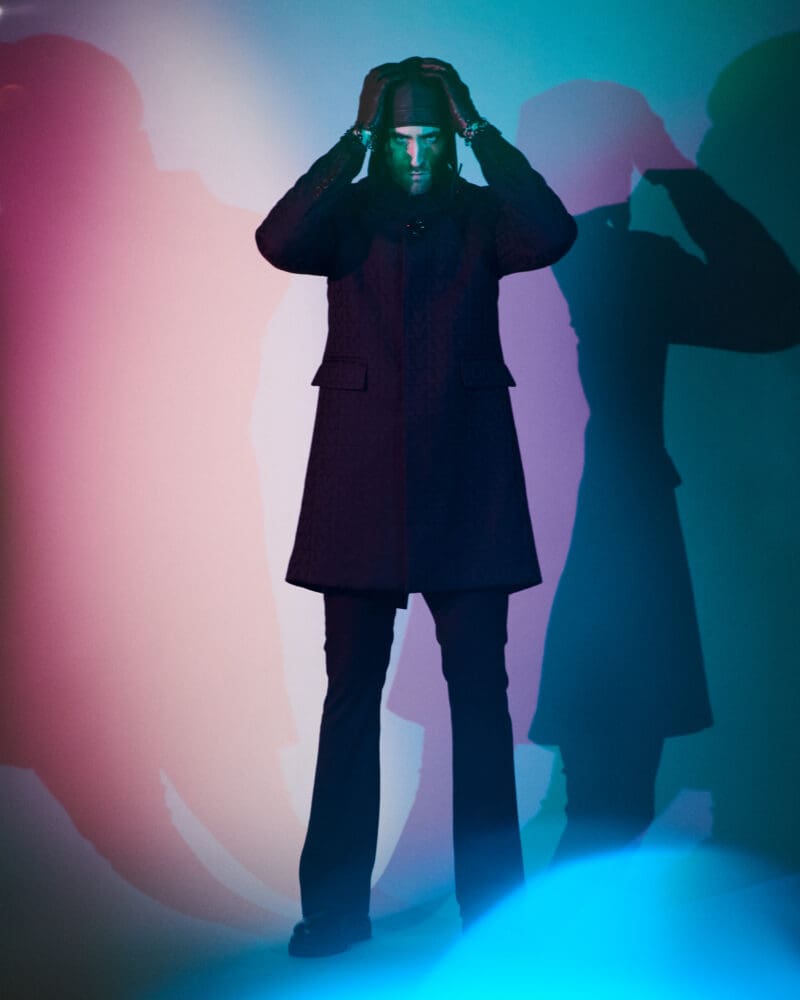
Photographer: Jason Hetherington
“They called me up and asked if I had ever ridden a motorbike. I was, like, ‘No, but I can ride a moped’. Then they asked if I had ever ridden a motocross. Again, I was, like, ‘No, but I do ride a lot of Lime bikes’. There was then a silence on the phone,” he laughs, recalling the initial call.
With the help of stuntman Jamie Dobb and co-star Jenna Coleman, the outcome is an amalgamation of cinematic references, plot twists and sudden gun scenes, offering a modern take on a familiar story.
Working again with Coleman, whom he also stars with in Wilderness, I ask what it’s like to be so collaborative with a fellow actor. “Working with anyone you have worked with before or that you have an off-screen bond with, it always makes these experiences easier as there’s an inherent trust,” he says. “You know that you’re going to hold each other in a scene which opens up this huge window of possibility of where you can go.”
There is a cathartic complexity in continually playing the antagonist on screen, but it’s not merely about playing the bad guy. It’s about having faith in the power of vulnerability in narratives. “If an opportunity comes along which feels like it’s going to scare you or make you use a different part of yourself, that can only be a good thing. This is all just an experiment. Some things work and some things don’t,” he continues.
“Ultimately all that everyone wants to do is tell stories that are going to open a conversation or make you think differently.” He pauses. “… I sound so lame”.



